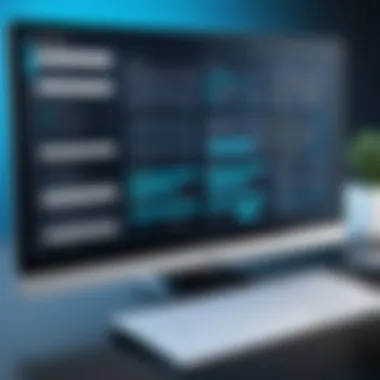Essential Reservation Software for Event Success


Intro
In the ever-evolving landscape of event management, reservation software plays a pivotal role in ensuring proficient organization and coordination. As businesses and organizations pivot towards technology-driven solutions, understanding the transformative power of these systems becomes essential. This article takes a comprehensive look at the essential features, advantages, and overall impact of modern reservation software on the events sector.
By exploring both the frustrations of manual event planning and the streamlined operations that software solutions offer, this discussion aims to highlight not only the functionalities required for effective reservation management but also the practical considerations in selecting the right software.
Here, we delve into the nuances of utilization, examining how technology can enhance the user experience and contribute significantly to the success of various events.
Prolusion to Reservation Software
In the modern events industry, effective management of reservations is crucial. Reservation software serves as a backbone for organizing events, whether they are corporate gatherings, weddings, or trade shows. By streamlining the booking process, it not only increases efficiency but also enhances the overall experience for both organizers and attendees. This section will explore the fundamental aspects of reservation software and its significance in event planning.
Understanding Reservation Software
Reservation software is a digital tool designed to facilitate the booking of various services and resources associated with events. This types of software can range from simple platforms that allow attendees to book tickets for specific events to complex systems that manage accommodations, catering services, and more. The main functionality of reservation software is to automate and simplify the reservation process. This can lead to reduced manual tasks, minimizing human error. When chosen and implemented correctly, reservation software can ensure a seamless experience from registration to event attendance.
Moreover, many reservation software systems come equipped with additional features such as customer management tools, reporting capabilities, and marketing integrations. These functionalities not only help in effective reservation management but also provide valuable insights into client behavior and preferences.
Importance in the Events Sector
The relevance of reservation software in the events sector cannot be overstated. It addresses several challenges that planners face daily. The efficiency gained by using this software allows event organizers to focus on other critical components of their planning processes, such as logistics, promotion, and guest experience.
Key Benefits of Using Reservation Software:
- Streamlined booking process
- Improved data management
- Enhanced customer communication
- Reduction in administrative workload
From large corporate conferences to intimate private functions, the ability to manage bookings in real-time can significantly impact the success of an event. This technology also allows for immediate feedback collection, helping organizers adjust their plans as needed. Furthermore, today's consumers demand convenience; reservation software meets this expectation by enabling easy access to event details and booking through multiple channels.
Key Features of Reservation Software
Reservation software is essential for modern event management, serving as a foundation that enables efficiency, organization, and customer satisfaction. The key features of such software play a significant role in determining the effectiveness of event planning and execution. By understanding these features, event organizers can select a software solution that best aligns with their specific needs, ultimately improving the overall event experience.
User-Friendly Interface
A user-friendly interface is integral to any reservation software. It ensures that both event organizers and attendees can navigate the system easily. The design should emphasize simplicity, reducing the learning curve for new users. Features like intuitive menus, clear labeling, and straightforward navigation paths contribute to a better experience.
It is also important that the interface is responsive on mobile devices since many users prefer booking on the go. A cluttered or overly complex interface can deter potential customers from completing bookings, leading to lost revenue opportunities for event planners. Therefore, a well-designed interface enhances usability while also reflecting the professionalism of the event organizers.
Real-Time Availability
Real-time availability is another critical feature for reservation software. It allows event organizers to showcase seat or space availability instantly. This feature is vital as it helps to prevent overbooking and reduces the administrative burden on staff who would otherwise need to manually verify available slots. Customers appreciate being able to see what is available during their booking process. This leads to faster decision-making, resulting in higher conversion rates. When users can access real-time information, it builds trust and enhances their overall satisfaction with the booking system.
Customizable Booking Options
The capability for customizable booking options enables event organizers to tailor the reservation process to fit specific event requirements. This includes the ability to adjust pricing tiers, set cut-off times for bookings, or implement varying cancellation policies. A flexible booking system allows for the integration of add-ons like meal selections, accommodation choices, or group discounts. Customization is not only important for tailoring the user experience but also for ensuring that the software can adapt to diverse event types and formats, from corporate seminars to weddings.
Integrated Payment Processing
Integrated payment processing simplifies transactions, enhancing the overall booking experience. Users expect a seamless method for paying, whether through credit cards, online wallets, or other digital payment methods. A reservation system that can securely process payments reduces the friction often associated with bookings. It allows for immediate confirmation of reservations, which is a significant advantage for both the organizer and attendees. Moreover, ensuring data security during transactions is essential to maintain user trust in the platform.
Having robust payment options also broadens the potential customer base, catering to varying preferences when it comes to payment methods.
Automated Confirmation and Notifications
Automated confirmation and notification features streamline communication between event organizers and attendees. Once a booking is made, an automatic confirmation email provides reassurance to the customer. This email typically includes important details such as the date, time, and location of the event, along with any additional instructions.
Furthermore, automated reminders leading up to the event can help reduce no-shows. Notifications about changes, additions, or updates can also be sent instantly, keeping attendees informed. This proactive approach to communication fosters a positive experience and builds a professional image for the event organizers.
In summary, the key features of reservation software directly impact the operational efficiency and user satisfaction in event management. By focusing on user-friendly interfaces, real-time availability, customized options, integrated payment processing, and automated communication, event organizers can significantly enhance their booking processes.
Benefits of Using Reservation Software
Reservation software serves a foundational role in the events sector. It not only streamlines administrative processes but also enhances user experience, leading to overall success in event management. Organizations that adopt such software observe various benefits that have become crucial in today’s competitive landscape. Optimizing the reservation process is essential, given the fast-paced environment that modern events operate in. This section will explore the efficiency and time savings, enhancement of the customer experience, and the advantages of data management and analytics.
Efficiency and Time Savings
Using reservation software automates many manual tasks traditionally associated with event management. This automation helps save a significant amount of time. For instance, rather than manually handling booking requests and confirmations, the software takes over these tasks. It enables event planners to focus on more strategic elements of their events.
Automation cuts down on errors. When bookings are made manually, there is always a risk of mistakes that can lead to overbooked venues or missed requests. Reservation software ensures accuracy through high levels of organization and systematic processing. Additionally, the real-time updates provided by such systems mean that event organizers can offer instant feedback to clients regarding availability and booking status.


Often, time-consuming tasks can be performed with just a few clicks. For example, sending confirmations or reminders can be automated, reducing the workload significantly. As a result, teams can allocate their resources more strategically, improving event quality and client satisfaction.
Enhancing Customer Experience
An emphasis on improving customer experience has become a priority for businesses today, especially in the events industry. Reservation software contributes to this by providing a smooth and seamless booking process for users. Clear and intuitive interfaces allow users to navigate effortlessly, reducing frustration during the reservation process.
Customers appreciate having access to real-time information. They can view what is available in real-time and make decisions without unnecessary delays. By providing easy access to booking information, organizations demonstrate a commitment to customer service, which can enhance loyalty and repeat business.
Moreover, quick access to customer support through chatbots or integrated messaging systems can resolve issues promptly, further improving the experience. Ensuring that clients feel valued and supported can differentiate a business in a crowded marketplace.
Data Management and Analytics
One of the most substantial advantages of using reservation software is the ability to gather and analyze data. Organizations can collect client information and reservation patterns, which can inform future strategies. Insights generated from this data can lead to better decision-making and more strategic planning.
Analytics help identify trends. This may include popular event types, preferred venues, or most desired dates for bookings. By understanding these patterns, businesses can tailor their offerings, ensuring they meet the market's demands effectively. Furthermore, having access to historical data allows for more accurate forecasting of resource needs for future events, making it a strategic asset.
In summary, the benefits of using reservation software extend far beyond mere functionality. Improved efficiency and significant time savings lead to more productive operations. Enhancing customer experience builds loyalty and increases satisfaction. Effective data management and analytics empower organizations to make informed decisions that will propel them forward in a competitive landscape. These factors establish reservation software as a vital component of successful event management.
"In an increasingly digital world, adopting technology is not just a choice; it’s a commitment to excellence."
Integrating these benefits into the organizational framework provides a strong case for the adoption of reservation software. As the events industry continues to evolve, embracing such solutions will be essential.
Types of Reservation Software
Understanding the types of reservation software is crucial for organizations looking to improve their event management processes. Different systems cater to various needs, ensuring that businesses can select a solution that fits their specific operational framework. This selection not only influences day-to-day operational efficiency but also affects customer satisfaction and business scalability.
Standalone Reservation Systems
Standalone reservation systems allow businesses to focus solely on managing bookings without additional functionalities. These systems are designed for simplicity and efficiency, making them ideal for smaller events or venues that do not require integration with other tools. Users can quickly navigate through various options, book spaces, and manage their calendars with minimal complexity.
Key benefits of standalone systems include:
- Cost-Effectiveness: They are typically more affordable than integrated solutions, requiring less investment upfront.
- Simplicity: These systems provide a straightforward user interface, making them easy to adopt for users who may not be tech-savvy.
- Focus on Core Functions: By handling only reservation functions, these systems can operate quickly and efficiently.
However, users should consider the limitations. Standalone systems may lack advanced features like analytics or customer relationship management, which can be vital for growth.
Integrated Event Management Platforms
Integrated event management platforms offer a comprehensive approach by combining reservation tools with a range of event planning features. This includes capabilities like marketing, ticketing, and post-event analysis. Such platforms are ideal for large-scale events where multiple aspects need to be managed simultaneously.
Benefits of integrated platforms include:
- All-in-One Solution: These platforms streamline operations by consolidating various functionalities into one system, reducing the need to switch between applications.
- Enhanced Data Management: Users can easily analyze data from different sources, helping to inform decision-making for future events.
- Better Customer Engagement: With features like email marketing and automated reminders, integrated platforms can help maintain a strong relationship with attendees.
Important considerations include:
- Higher Cost: Integrated solutions often come with a higher price tag due to their extensive features.
- Learning Curve: The added functionalities may require more training for users.
Industry-Specific Solutions
Some reservation systems are tailored to meet the unique demands of specific industries, such as hospitality, corporate, or entertainment. These customized solutions are designed to cater to the nuanced requirements of each sector, ensuring compliance with industry standards and enhancing operational efficiency.
Benefits of industry-specific solutions involve:
- Customization and Flexibility: These systems often allow for customized workflows to suit the specific needs of an industry.
- Expertise and Support: Providers of these systems typically understand the industry landscape, offering expert advice and support tailored to the user’s needs.
- Regulatory Compliance: Tailored solutions ensure businesses remain compliant with industry regulations, which can be crucial for operational legality.
On the downside, organizations must evaluate:
- Niche Focus: While highly specialized, these systems may lack broader functionalities found in integrated platforms.
- Market Limitations: The user base may be limited to specific industries, affecting future scalability.
Considerations for Selecting Reservation Software
Selecting the right reservation software is a crucial step in ensuring the success of any event. Various elements come into play when making this choice, including the specific needs of your business, budget limitations, and the requirements for scalability and flexibility. Understanding these considerations will help to inform your decision and ensure that the software will serve its intended purpose effectively.


Assessing Business Needs
Assessing business needs involves a thorough analysis of what your organization aims to achieve through reservation software. It is essential to clearly identify the types of events you manage, the expected volume of transactions, and any unique requirements specific to your operations.
Factors to evaluate include:
- Event Types: Corporate meetings, conferences, or social gatherings may have distinct requirements.
- User Experience: Evaluate what level of user interface familiarity your staff or clients may require.
- Integration Needs: Consider if you need the software to integrate with existing technologies or platforms your organization uses.
Conducting a needs assessment helps to narrow down choices, making it easier to select software that best matches your operational demands.
Budget Constraints
Budget constraints play a significant role in software selection. The cost of reservation software can vary widely based on functionalities, the number of users, and additional services offered such as customer support or training.
When budgeting, consider the following:
- Initial Costs vs. Ongoing Expenses: Factor in one-time fees for implementation as well as recurring subscription or maintenance costs.
- ROI Assessment: Analyze how the software is likely to improve efficiency or increase revenue to justify the investment.
- Hidden Fees: Be aware of any potential hidden fees for features that you may need in the future.
Understanding budget constraints allows decision-makers to set realistic expectations that align with financial capabilities, ensuring a more informed investment approach.
Scalability and Flexibility
Choosing scalable and flexible reservation software is essential for growth and adaptation to changing business needs. A solution that can grow with your organization will save time and resources in the long term.
To evaluate scalability and flexibility, reflect on:
- User Capacity: Determine if the software can accommodate future increases in users or transaction volume.
- Feature Expansion: Assess if additional features can be added without requiring an entirely new system.
- Industry Changes: Consider how easily the software can adapt to trends or shifts in your industry, such as new event formats or technologies.
Select software that aligns with long-term goals and positions your organization well for the future.
"Selecting appropriate software is not just about today’s needs; it is about future-proofing your operations."
Case Studies: Successful Implementation
Case studies illuminate the practical application and effectiveness of reservation software in various event contexts. They serve as real-world examples demonstrating how different organizations leverage these tools to streamline operations, enhance efficiency, and ultimately achieve favorable outcomes for their events. By analyzing specific case studies, decision-makers can better understand the nuances that drive successful implementation. This section delves into three distinct categories of events—corporate events, conferences and trade shows, and weddings and private events—highlighting how reservation software plays a vital role.
Corporate Events
Corporate events often require meticulous planning due to their significance to a company's image and marketing efforts. A case study involving a large software firm illustrates the integration of reservation software in managing an annual product launch. The firm shifted from traditional methods to an automated system that allowed easy registration and tracking of attendees.
Some key benefits included:
- Increased Attendance: The user-friendly interface greatly simplified the registration process, resulting in a significant uptick in attendee numbers.
- Data Collection: The software's analytics tools provided essential data on attendee demographics, helping the company tailor future events more effectively.
- Seamless Communication: Automated confirmations and reminders kept attendees informed, reducing no-shows and improving overall engagement.
Conferences and Trade Shows
In the context of conferences and trade shows, reservation software streamlines not only participant registration but also booth allocation and scheduling sessions. A prominent industry conference employed a comprehensive reservation system, allowing exhibitors and attendees to navigate the event with ease. This deployment resulted in several advantages:
- Real-Time Updates: The integration of real-time availability ensured exhibitors could adjust their plans based on current registrations and interest.
- Enhanced Exhibitor Experience: Customizable booking options allowed exhibitors to manage their schedules effectively, contributing to a smoother exhibition flow.
- Cost Efficiency: The integrated payment processing facilitated quick and secure transactions, helping organizers manage finances more efficiently.
Weddings and Private Events
Planning weddings or private events is a delicate process full of emotional and logistical complexities. Reservation software has become pivotal in helping brides, grooms, and event planners navigate these challenges. A wedding planning platform's successful use of reservation software demonstrates its efficacy:
- Personalized User Experience: Couples could customize their booking options, from venue selection to catering needs, which catered to individual preferences.
- Guest Management: Automated notifications kept guests informed about changes in plans, enhancing the overall experience.
- Time-Saving Efficiency: Streamlining the reservation process allowed planners to focus on creative aspects, rather than administrative tasks.
"By looking into these successful case studies, businesses can gauge the possible benefits specific to their own needs. Understanding the software's impact on similar events can guide decision-making processes."
In summary, these case studies underscore the transformational potential of reservation software across different event types. Each case reflects the capacity of such tools to improve efficiencies, drive engagement, and enhance user experiences. Therefore, understanding these implementations will assist organizations in making informed decisions about adopting similar technology.
Challenges in Reservation Software Implementation


Implementing reservation software presents significant challenges. Understanding these obstacles is crucial for successful adoption and operational efficiency. Issues can arise during system integration, staff training, and ongoing use, impacting the effectiveness of event management. Identifying these challenges early can help organizations mitigate potential disruptions and streamline their operational workflows.
Technical Difficulties
Technical difficulties are common in the implementation of reservation software. These issues can range from software bugs to network failures. When a system does not perform as expected, it can lead to delays in booking processes and frustrate end users.
Integrating the reservation system with existing platforms can also be complex. Companies often use multiple systems for different functions like marketing, customer management, and payment processing. If these systems do not communicate effectively, it can hinder the booking experience and data accuracy. Regular maintenance and updates are essential to minimize these technical issues.
Organizations need a dedicated IT team to monitor functionality and troubleshoot any problems as they arise. Additionally, providers should offer robust customer support to address technical inquiries promptly.
User Adoption Issues
User adoption issues can significantly impact the effectiveness of reservation software. When staff members resist using the system, it can lead to improper utilization or even complete abandonment of the software. This resistance often stems from a lack of training and familiarity with the new system.
It is important for organizations to invest time in training sessions for staff. These sessions should cover not only how to use the software, but also emphasize its benefits in streamlining workflows and enhancing customer service.
Furthermore, user-friendly interfaces can increase acceptance. If the software is intuitive, employees will find it easier to adopt in their daily tasks.
Management must also engage employees by gathering feedback during the trial phase. This helps in making adjustments and instills a sense of ownership among users, which can lead to better adoption rates. Ultimately, ensuring that users feel comfortable and supported during the transition is key to overcoming these adoption challenges.
Future Trends in Reservation Software
The realm of reservation software for events is experiencing rapid transformation. As technology evolves, so too must the tools used within the event management sector. Understanding these future trends is invaluable for decision-makers and IT professionals seeking effective solutions. This section examines two significant trends: AI and automation, as well as mobile integration. Both are reshaping how events are planned, managed, and executed.
AI and Automation
Artificial intelligence and automation are becoming integral to reservation software. AI algorithms optimize user experiences by analyzing booking patterns. They predict demand, allowing event planners to make data-driven decisions. For instance, AI can suggest the best times for event scheduling based on historical data. This reduces the risk of scheduling conflicts and maximizes participation.
Automation enhances efficiency. Tasks like sending confirmations, managing attendee lists, and processing payments can be automated. This saves time and minimizes the potential for human error. By streamlining administrative processes, organizations can focus on higher-level strategic planning.
Benefits include:
- Improved operational efficiency.
- Enhanced customer service through quick responses.
- Increased data accuracy, reducing mistakes.
"AI and automation are not just trends; they are game changers for the events industry, providing tools that allow for smarter, faster, and more efficient event management."
Mobile Integration
The shift towards mobile solutions is undeniable. More attendees are using mobile devices for reservations and event information. Reservation software that integrates well with mobile platforms can significantly improve user experience. Easy access to booking systems via smartphones is a crucial factor in attendee satisfaction.
With mobile integration, features like in-app notifications, real-time updates, and digital ticketing become standard. Event planners can communicate with attendees instantly, updating them about changes or necessary information. This reduces confusion and enhances engagement, contributing to overall event success.
Key considerations include:
- Ensuring user-friendly mobile interfaces.
- Offering secure payment options through mobile platforms.
- Providing seamless access to event details from any device.
Epilogue
Understanding and effectively implementing reservation software is crucial for success in the events sector. This section synthesizes key findings and insights discussed throughout the article, offering decision-makers a clear perspective on why selecting the right software matters.
Summarizing Key Insights
Throughout this exploration, several critical insights have emerged:
- Efficiency: Reservation software improves operational efficiency by automating tasks that would otherwise be manual. This leads to time savings and reduced operational costs.
- User Experience: A user-friendly interface significantly enhances customer satisfaction. Attendees appreciate seamless booking processes that are hassle-free and straightforward.
- Data Management: The ability to analyze data and generate reports facilitates better decision-making. Enhanced analytics allows event planners to understand trends and preferences.
- Adaptability: With the ever-changing landscape of event planning, choosing versatile software that can adapt to various needs is vital. Systems that integrate with existing tools can provide an added advantage.
A cohesive blend of these elements contributes to smoother event management processes, which ultimately lead to more successful outcomes for hosts and attendees alike.
Final Thoughts on Selection and Implementation
When it comes to selecting reservation software, careful consideration is necessary. Here are some key considerations:
- Needs Assessment: Begin with a thorough assessment of your specific requirements. Ensure the software can handle the volume of bookings and the unique aspects of your events.
- Budget Scrutiny: Understand your budget constraints. Compare different offerings and choose a solution that provides the best value without compromising on essential features.
- User Adoption: Consider user training and support. A software that is easy to use will lead to better user adoption among staff and a more positive experience for customers.
As the events sector continues to evolve, staying updated with the latest features and trends in reservation software will be essential. Automation, mobile accessibility, and analytics are just a few areas that are gaining momentum. By making informed choices, event planners can ensure that their technological foundation meets their needs now and in the future.
"The right reservation software is not just a tool; it's a partner in your event's success. Make the choice with insight, and reap the benefits."
By integrating the right features, understanding your organizational needs, and investing in quality implementation, you can significantly enhance your event management capabilities.







